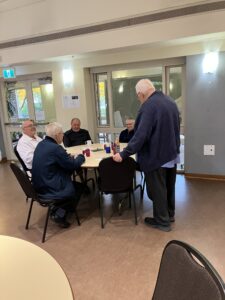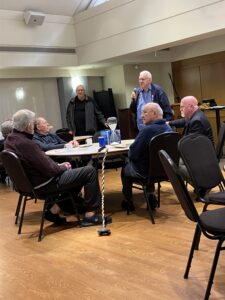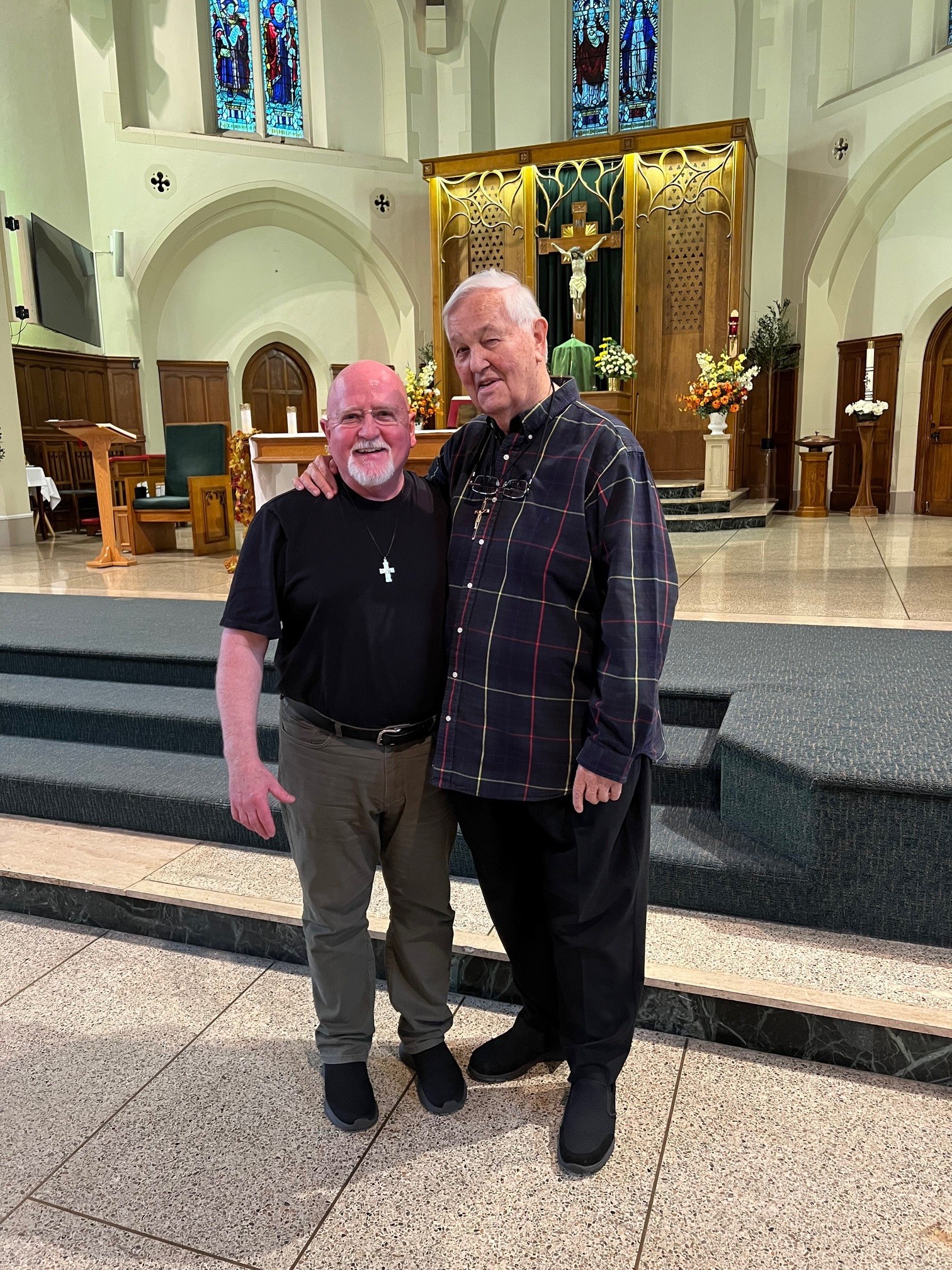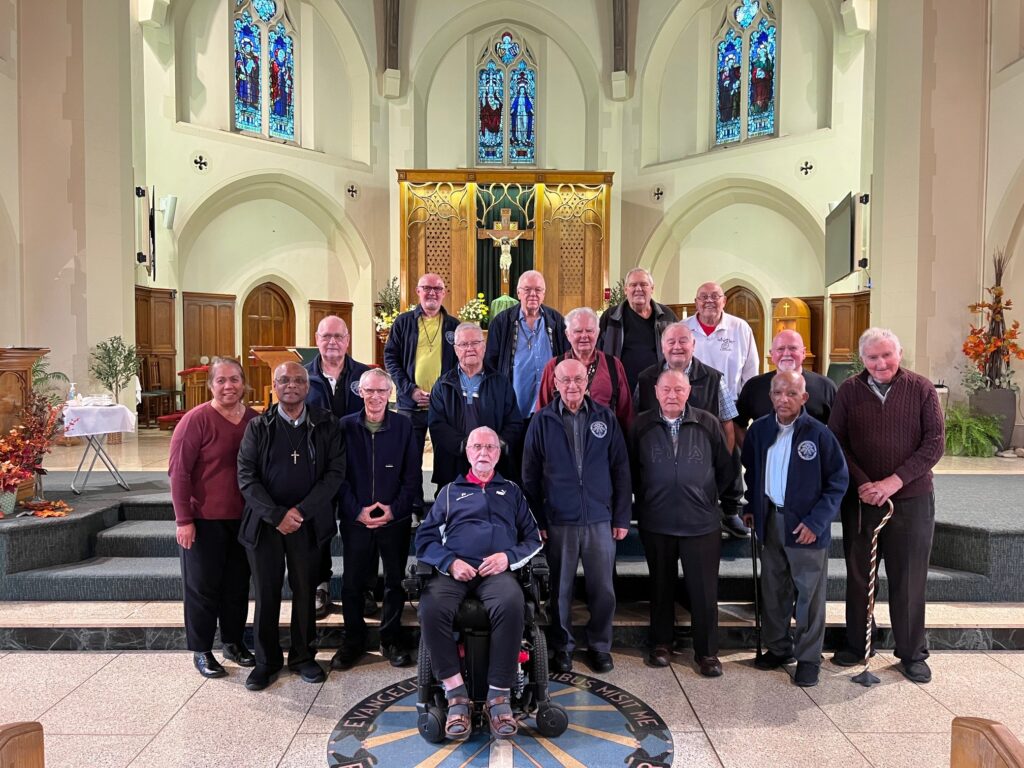Three days in the practice of listening – A great gift to the BC Oblate Community
The Oblate Houses of B.C. invited Fr. Leo English, a Redemptorist, to guide us in three days of reflection and sharing. Many Oblates because of age and health were not able to participate in the Retreat last June in Niagara Falls. I offer you a glimpse into the richness that we experienced in these days through the words and insights of Fr. Leo but even more precious the sharing of our brother Oblates in small table groups, as well as with all present. Nineteen of twenty-one Oblates participated.
The over-riding theme of these days was the call to listen. Perhaps the most important thing we ever give each other is our attention, given from the heart. When people are talking there is no need to do anything but receive them. Listen to what they are saying and care about it. Most times, caring about it is even more important than understanding it. To truly listen, to offer our attention without judgment or agenda, is to affirm the sacredness of another’s story. This kind of presence becomes a form of communion more powerful than words or rituals. It is not about fixing problems but about validating the other’s experience.
Living the Easter Story: A Sacred Mission in Every Season
Fr. Leo gleaned a wisdom from one of Fr. Ron Rolheiser’s articles describing “meta-narrative”, that there is a Good Friday and an Easter Sunday in every moment. In the rhythm of Christian life, the Easter story is not confined to a single day or season. It is a living narrative, unfolding in the hearts of believers, especially those who have walked long paths of ministry and now find themselves in quieter chapters of life. It’s in you and in me. It is what Jesus lived, and we preached about our whole life. Suffering and resurrection coexist in every moment. We are Easter people living in a Good Friday world, called to recognize the hope that follows hardship. This spiritual rhythm invites reflection: What must die in our lives so that something new can be born? What burdens must we lay down to experience inner freedom? The Easter story, Christ’s journey from death to resurrection, is not merely a historical event but a spiritual template for transformation, hope, and renewal. As Ron Rolheiser reminds us, “There is a Good Friday and an Easter Sunday in every moment.” This truth invites us to reflect deeply: What must die in us so that something new may rise?
For those who have spent decades in ministry, the Easter story becomes a mirror. It reflects the sacrifices made, the griefs endured, and the resurrections experienced. Whether in Gaza, Ukraine, or the solitude of a retirement home in Vancouver, the invitation remains: to embody resurrection, to live with hope, and to be signs of new life.
 Storytelling as Sacred Practice
Storytelling as Sacred Practice
Storytelling is more than a method of communication; it is a sacred practice. It bridges the gap between generations, cultures, and hearts. Indigenous traditions teach us that stories are vessels of wisdom, identity, and healing. In ministry, storytelling becomes a way to connect the Gospel with lived experience. “Tell me the facts and I will learn. Tell me the truth and I will believe. But tell me a story and it will live in my heart forever.”
Each priest and Brother, each minister, carries a treasury of stories—of baptisms, funerals, confessions, and quiet moments of grace. These stories are not just memories; they are testimonies of God’s presence. They are the Gospel incarnate in everyday life. When shared, they validate the sacredness of others’ journeys and remind us that our lives are not isolated chapters but part of a divine narrative.
The Ministry of Presence
In a world increasingly shaped by artificial intelligence, misinformation, and digital noise, the ministry of presence stands as a counter-cultural witness. It is not about fixing problems or offering solutions. It is about being there; listening, validating, and accompanying. “People will remember more than the Eucharist brought to their sick bed, how you made them feel.” The simple act of listening can be a form of sacred communion, a way of bringing the body of Christ to others.
Presence is powerful. It transforms rooms into sanctuaries and conversations into sacraments. It is the ministry of the heart, where compassion, mercy, and understanding become the tools of healing. In the sacrament of reconciliation, in hospital visits, or in casual chats over coffee, presence becomes a gift—a grace that affirms the dignity and worth of every person.
Loneliness and Community
Yet, presence is not always easy. Loneliness can creep in, especially in retirement or in times of transition. We had permission and incentive to share deeply at tables and in the larger group. We heard personal sharing of painful loneliness. Loneliness is not weakness; it is a human reality. And in naming it, we open the door to healing. Fr. Leo was wise enough to speak thanks for such sharing, and to recognize that such truth speaking, voiced what perhaps all of us carry.
It was acknowledged that as a community, we don’t share, as we did at this retreat. We keep to ourselves. Part of this might be deemed respect for one another’s privacy. We don’t visit one another’s rooms. It was said that it is a lonely life. But even small gatherings, a daily 5 o’clock chat, a card game, a shared meal—can become lifelines. They remind us that we are not alone, that our stories matter, and that we are still part of something sacred. As ministers, creating spaces of belonging is part of our mission, even in retirement. It is about being vulnerable, being real, and being together.
 This Stage of Life Is Also Mission
This Stage of Life Is Also Mission
Retirement is not the end of mission; it is a new beginning. It is a quieter mission, perhaps less public, but no less sacred. It is a mission of letting go of roles, titles, control, and regrets. Letting go is not failure; it is the fertile ground of resurrection. It is a proclamation that God’s love is enough.
This stage invites a deeper surrender. As bodies slow down and independence narrows, we are called to trust, to receive, and to rest in God’s grace. It is a new form of obedience, a hidden fruitfulness. It is the art of letting go, not to give up, but to give over. To say yes again, as we did at the beginning of our vocation, and to trust that the Spirit continues to work through us.
St. Eugene de Mazenod: Seeing Christ in Weakness
St. Eugene de Mazenod, our founder, taught us to see Christ in the poor and abandoned. His favorite Gospel stories—the Samaritan woman at the well and the prodigal son reveal a God who meets us in our weakness, who offers mercy, and who calls us home. Eugene’s vision was not just about doing mission; it was about being Christ’s presence in the world.
To see Christ in weakness and powerlessness is to recognize the sacred in the overlooked, the broken, and the forgotten. It is to preach not from perfection but from vulnerability. When we share our own griefs, our own need for Easter, we give others permission to do the same. We become living Gospels—stories of hope, redemption, and love.
In this season of life, may we embrace the Easter story anew. May we tell our stories with courage, offer our presence with compassion, build community with intention, and live our mission with grace. And may we, like St. Eugene, continue to see Christ in every face, especially in those who feel powerless. For in doing so, we proclaim the heart of the Christian story: that love is stronger than death, and resurrection is always possible.
By Ken Forster, OMI



